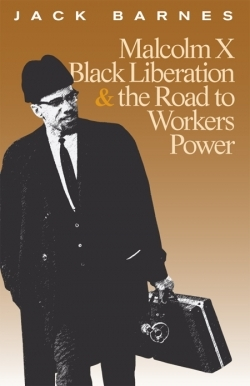Malcolm X, Black Liberation, and the Road to Workers Power
Socialism and communism are now regarded by most Americans as unworkable theories that created murderous dictatorships instead of the egalitarian, classless societies of which Marx and Engels dreamed. The human suffering caused by Stalinism is emphasized in high school English classes when students read George Orwell’s Animal Farm, and many adults under forty would be hard-pressed to explain why Cuba’s communist government presented “a clear and present danger” to democracy during the Cold War or why the United States’ trade embargo is still a controversial topic for Cuban Americans and the Obama administration.
This new book uses the last “fifty weeks” of Malcolm X’s life to anchor a trenchant socialist analysis of American class and race politics. Author Jack Barnes is the national secretary of the Socialist Workers Party, and the book includes his interviews with Malcolm X, commemorative speeches, an interview with Leon Trotsky, and a historical review since the defeat of Reconstruction that molded Malcolm into the leader he became. It also includes 123 period photographs and illustrations of black protests, police brutality, and even a lynching that its perpetrators publicized on a postcard.
Although the book’s project is not immediately clear because it changes topics abruptly, people who are interested in the history of civil rights, political theory, or socialism will find it fascinating. Barnes makes important connections between the tragedy of Malcolm X’s assassination and the reasons behind entrenched African American poverty now. By connecting leaders as diverse as Che Guevara, Fidel Castro, Nelson Mandela and Barack Obama, Barnes insists that the most revolutionary concepts of the civil rights movement have been nullified, silenced by a focus on individual talent instead of group consciousness. Racial politics in America has been translated into a politics of meritocracy and class that encourages African Americans, Hispanics, and lower-class whites to equate material success—even when purchased on credit—with power. However, if we measure progress by counting black CEOs and homeowners, we lose sight of how many are still being left behind.
Black men are eight times more likely than white men to be imprisoned, and “the jobless rate for workers who are Black [is] 75 percent higher than for workers who are white.” Single motherhood is on the rise, and real income continues to drop. Blindness to the causes of these problems stems from “ideological rationalizations for class exploitation and inequality” that keep intellectuals committed to a “parasitical” existence devoted to supporting the big money that pays for their nannies and dog-walkers.
Socialism’s insights into the workings of capitalism have long been considered its greatest strength, even though democracy subverts its most radical aims. Just as working class home owners become more politically conservative because they erroneously believe they have a vital stake in capitalism’s agenda, elected officials from any party are likely to believe that changing the system from within will work better than overthrowing it. Many of today’s truck drivers, cashiers, and service personnel work in isolation that makes it all too easy to forget that their interests lie with others like themselves, not with the bankers and mortgage brokers who sold them subprime mortgages and whose bailouts they are financing.
Reviewed by
Elizabeth Breau
Disclosure: This article is not an endorsement, but a review. The publisher of this book provided free copies of the book and paid a small fee to have their book reviewed by a professional reviewer. Foreword Reviews and Clarion Reviews make no guarantee that the publisher will receive a positive review. Foreword Magazine, Inc. is disclosing this in accordance with the Federal Trade Commission’s 16 CFR, Part 255.

